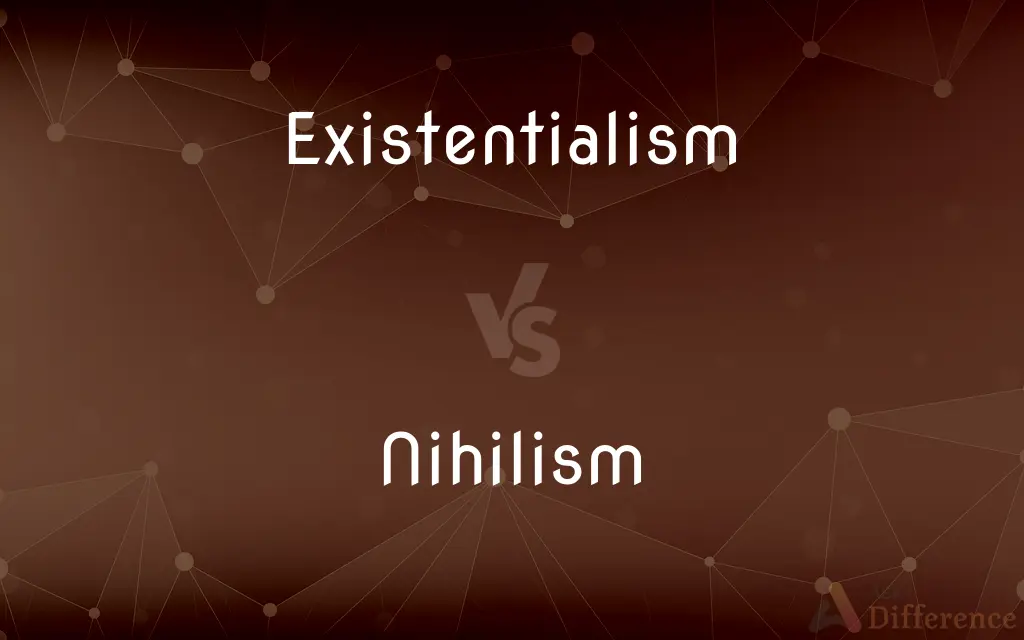Existentialism vs. Nihilism — What's the Difference?
By Tayyaba Rehman & Fiza Rafique — Updated on March 24, 2024
Existentialism emphasizes finding self and the meaning of life through free will and choice, whereas nihilism suggests that life has no inherent meaning or value.

Difference Between Existentialism and Nihilism
Table of Contents
ADVERTISEMENT
Key Differences
Existentialism is a philosophical movement that posits life's essence is defined by the individual's actions, decisions, and search for meaning. It argues that despite the inherent absurdity of life, individuals can and should create their own purpose. Nihilism, on the other hand, is the philosophical belief that life lacks objective meaning, purpose, or intrinsic value, and dismisses the significance of moral or societal constructs.
While existentialists acknowledge the absurdity and inherent meaninglessness of the universe, they believe in the potential of individuals to imbue their own lives with meaning through their choices and actions. Nihilists, however, perceive the search for meaning as futile, asserting that no such meaning exists or can be created.
Existentialism encourages embracing one's freedom and responsibility to forge a personal path and values in a seemingly indifferent universe. In contrast, nihilism often leads to a detachment from traditional moral values, seeing them as baseless or arbitrary.
The existential approach is inherently optimistic about human potential and the capacity for self-definition and finding personal significance in life. Nihilism presents a more pessimistic view, suggesting that because life has no inherent meaning, efforts to find or create one are ultimately meaningless.
Existentialism and nihilism both deal with the crisis of human existence and the universe's apparent indifference, but they diverge in their responses to this condition. Existentialism is about the journey of finding or creating meaning within an absurd reality, whereas nihilism accepts the absence of meaning as a fundamental aspect of existence.
ADVERTISEMENT
Comparison Chart
Core Belief
Life’s meaning is created by individual choices.
Life has no inherent meaning or value.
View on Meaning
Meaning is subjective and self-made.
Rejects the notion of universal or inherent meaning.
Attitude towards Life
Optimistic, emphasizes personal freedom and responsibility.
Pessimistic, often views efforts to find meaning as futile.
Role of Individual
Central, as the creator of their own meaning and values.
Minimal, as life’s lack of meaning renders personal efforts irrelevant.
Philosophical Approach
Action and choice-oriented, existentialist ethics focus on individual authenticity.
Often associated with skepticism and detachment from traditional values.
Compare with Definitions
Existentialism
Absurdity.
Existentialists acknowledge life’s inherent absurdity but see it as a challenge to overcome.
Nihilism
Pessimism.
The realization that life lacks objective meaning can lead to a pessimistic outlook.
Existentialism
Authenticity.
Living authentically means making choices based on personal values, not societal expectations.
Nihilism
Rejection of Morality.
Moral values are seen as arbitrarily constructed, lacking objective validity.
Existentialism
Search for Meaning.
Existentialists argue that individuals must find their own purpose in a meaningless universe.
Nihilism
Meaninglessness.
Nihilists believe that life has no inherent meaning, value, or purpose.
Existentialism
Individual Freedom.
The belief that one is free to make their own choices defines existentialist thought.
Nihilism
Skepticism.
Nihilism involves a skeptical view of knowledge, truth, and the external world.
Existentialism
Responsibility.
With freedom comes the responsibility to give one's life meaning and accept the consequences of choices.
Nihilism
Detachment.
Some nihilists advocate for detachment from societal norms and values seen as meaningless.
Existentialism
Existentialism ( or ) is a form of philosophical inquiry that explores the problem of human existence and centers on the experience of thinking, feeling, and acting. In the view of the existentialist, the individual's starting point has been called "the existential angst," a sense of dread, disorientation, confusion, or anxiety in the face of an apparently meaningless or absurd world.
Nihilism
Nihilism (; from Latin nihil 'nothing') is a philosophy, or family of views within philosophy, expressing negation (i.e., denial of) towards general aspects of life that are widely accepted within humanity as objectively real, such as knowledge, existence, and the meaning of life. Different nihilist positions hold variously that human values are baseless, that life is meaningless, that knowledge is impossible, or that some set of entities do not exist, are meaningless, or pointless.The study of nihilism may regard it as merely a label that has been applied to various separate philosophies, or as a distinct historical concept arising out of nominalism, skepticism, and philosophical pessimism, as well as possibly out of Christianity itself.
Existentialism
A philosophy that emphasizes the uniqueness and isolation of the individual experience in a hostile or indifferent universe, regards human existence as unexplainable, and stresses freedom of choice and responsibility for the consequences of one's acts.
Nihilism
(Philosophy) The doctrine that nothing actually exists or that existence or values are meaningless.
Existentialism
A twentieth-century philosophical movement emphasizing the uniqueness of each human existence in freely making its self-defining choices.
The heyday of existentialism occurred in the mid-twentieth century.
Nihilism
Relentless negativity or cynicism suggesting an absence of values or beliefs
Nihilism in postwar art.
Existentialism
The philosophical views of a particular thinker associated with the existentialist movement.
Sartre's existentialism is atheistic, but the existentialism of Marcel is distinctly Christian.
Nihilism
Political belief or action that advocates or commits violence or terrorism without discernible constructive goals.
Existentialism
A philosophical theory or attitude having various interpretations, generally emphasising the existence of the individual as a unique agent with free will and responsibility for his or her own acts, though living in a universe devoid of any certain knowledge of right and wrong; from one's plight as a free agent with uncertain guidelines may arise feelings of anguish. Existentialism is concerned more with concrete existence rather than abstract theories of essences; is contrasted with rationalism and empiricism; and is associated with Kierkegaard, Heidegger and Sartre, as well as others.
Nihilism
Also Nihilism A diffuse, revolutionary movement of mid-19th-century Russia that scorned authority and tradition and believed in reason, materialism, and radical change in society and government through terrorism and assassination.
Existentialism
(philosophy) a 20th-century philosophical movement; assumes that people are entirely free and thus responsible for what they make of themselves
Nihilism
(Psychiatry) A delusion, experienced in some mental disorders, that the world or one's mind, body, or self does not exist.
Nihilism
The view that all endeavours are devoid of objective meaning.
Existential nihilism
Nihilism
The rejection of, or opposition to, religious beliefs, (inherent or objective) moral principles, legal rules, etc., often due to the view that life is meaningless (sense 1).
Moral nihilism
Nihilism
The rejection of non-proven or non-rationalized assertions in the social and political spheres of society.
Nihilism
A delusion that oneself or the world, or parts thereof, have ceased to exist.
Nihilism
Alternative case form of Nihilism
Nihilism
A doctrine grounded on the negation of one or more meaningful aspects of life; in particular, the view that nothing in the world actually exists.
Nihilism
(countable) Something that is regarded as meaningless.
Nihilism
Nothingness; nihility.
Nihilism
The doctrine that nothing can be known; scepticism as to all knowledge and all reality.
Nihilism
The theories and practices of the Nihilists.
Nihilism
A revolutionary doctrine that advocates destruction of the social system for its own sake
Nihilism
The delusion that things (or everything, including the self) do not exist; a sense that everything is unreal
Nihilism
Complete denial of all established authority and institutions
Common Curiosities
Is nihilism always negative?
While commonly associated with pessimism, some interpret nihilism as freeing, removing arbitrary constraints on thought and behavior.
What is the main difference between existentialism and nihilism?
Existentialism finds meaning through individual choice, while nihilism denies inherent meaning in life.
Can existentialism and nihilism be reconciled?
While they share some underlying themes, their core tenets are often seen as opposing, making reconciliation difficult.
Do existentialists believe in God?
Existentialism doesn't inherently reject or accept the existence of God; it focuses on individual existence and choice.
How do nihilists view ethics and morality?
Nihilists often view ethics and morality as subjective constructs without inherent truth or value.
How does existentialism address the concept of freedom?
Existentialism emphasizes freedom of choice and the responsibility that comes with it as central to human existence.
Can existentialism lead to happiness?
By finding or creating personal meaning and living authentically, existentialism suggests individuals can achieve fulfillment.
How do existentialists define 'authenticity'?
Authenticity involves living according to one’s own values and beliefs, rather than conforming to societal expectations.
What does nihilism say about the purpose of life?
Nihilism argues that life has no predetermined purpose or inherent value.
Can a nihilist find personal meaning in life?
While nihilism suggests life lacks objective meaning, individuals may still create subjective meanings for themselves.
What role does absurdity play in existentialism?
Absurdity highlights the contrast between humans' desire for meaning and the silent, indifferent universe, prompting a search for personal significance.
Why do nihilists reject traditional values?
Because they view these values as lacking objective foundation or inherent meaning.
How do existentialists view the role of society?
Society influences individuals, but existentialists emphasize personal responsibility in defining one’s essence beyond social constructs.
Is existentialism a form of nihilism?
While both address life’s apparent lack of inherent meaning, existentialism is action-oriented and optimistic about creating personal meaning, unlike nihilism.
What is existential freedom?
The concept that individuals are free to make their own choices and define their existence.
Share Your Discovery

Previous Comparison
Diction vs. Tone
Next Comparison
Innovative vs. InventiveAuthor Spotlight
Written by
Tayyaba RehmanTayyaba Rehman is a distinguished writer, currently serving as a primary contributor to askdifference.com. As a researcher in semantics and etymology, Tayyaba's passion for the complexity of languages and their distinctions has found a perfect home on the platform. Tayyaba delves into the intricacies of language, distinguishing between commonly confused words and phrases, thereby providing clarity for readers worldwide.
Co-written by
Fiza RafiqueFiza Rafique is a skilled content writer at AskDifference.com, where she meticulously refines and enhances written pieces. Drawing from her vast editorial expertise, Fiza ensures clarity, accuracy, and precision in every article. Passionate about language, she continually seeks to elevate the quality of content for readers worldwide.
















































